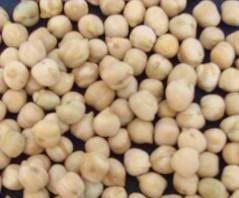Recently a friend of mine made an amazing Indian meal that featured a dish made with chick peas. It was a wonderful amalgam of spices, chick peas and vegetables. The chick pea of course is not exclusively Indian and appears in many cuisines in the world from Italian to Middle Eastern. Hummus is the Arabic word for “chickpea”.
So as we were eating this outstanding Indian meal, we started to talk about the chick pea. I wondered where “garbanzo bean” came from. “Garbanzo sounds like the name of an Italian Circus family”, I said, “like an acrobat family, you know?” “We call them chi chi beans in my family” said another Italian-American friend of mine. And I thought, wow. lots of names. So with all this in my head, I needed to sit down, and figure it all out.
Latin. Things always seem to start there for us Westerners. In Latin, the chick pea was called cicer related to the name Cicero. Some say because the wart on the end of Cicero’s nose resembled the chick pea.
From Latin cicer became ceci in Italian and ciche in French. 1066 brought the word and the legume to the shores of England and the English called it the ciche pease which eventually became Chick pea. This evolution is logical and makes sense so where does Garbanzo bean come from?
Is it named after the Italian circus family? NO! Most likely, although it’s disputed, garbanzo comes from Basque into Spanish. In Basque it is thought that garbanzo is a compound word, made up of garau, seed + antzu, dry.
Hmm, time for some hummus!!

Robert Aiudi, a.k.a., The Language Chef, has been known to his friends and family as a “language junkie” nearly his entire life. He is fluent in many, conversational in others and can fake it through another large amount of some of the most exotic languages in the world. He has taught and tutored many happy students, and annoyed people over the years by asking “how do you say that?”.
From his young years surrounded by speakers of three different dialects of Italian, to university in France and German and extensive work in Asia, China, Taiwan, Japan, Robert has picked up languages and breathed in the cuisines of many countries. Translating from 27 languages into English, Robert is a repository of anecdotal and factual information about languages of all sorts which adds flavor and depth to the Language Chef.
An expert amateur cook, Robert has worked in Paris in small bistro, made pizzas in Florence, wrangled recipes out of the hands of German grandmothers in the Black Forest, worked in a Chinese restaurant and had ad hoc cooking lessons in restaurants in China, Taiwan and Japan as well as various Chinatowns. Most importantly, Robert, his mom and dad, two grandmothers and lots of aunts from Italy have made culinary magic in their kitchens for generations.










